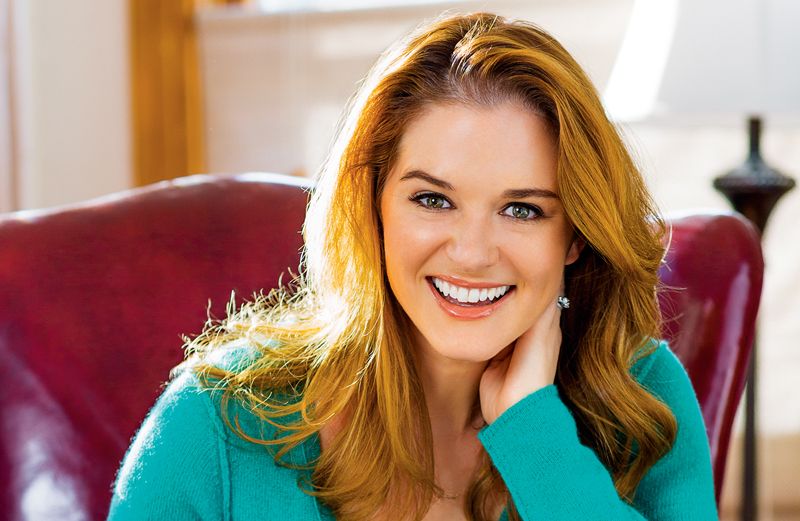Fear. It can hit when you least expect it. When everything in your life is going great, when your dreams are being fulfilled, when you’ve become what you had hoped to become, even when you’re a person of faith and used to calling on that faith and leaning on it.
That’s what happened to me not long ago. Even though I chose the notoriously difficult profession of acting, I’d been fortunate in my career. I was cast in a professional production right out of college. Since then I’d had roles in a Broadway play, television and movies.
At last I’d landed a regular recurring role on one of America’s most popular TV series, Grey’s Anatomy, and my husband, Peter, and I, after 10 years of marriage, were expecting our first child. I should have been on top of the world.
ENJOY THESE GUIDEPOSTS BOOKS FOR FATHERS
I wasn’t. My marriage was solid, I loved my job, but I was terrified, absolutely terrified, by the prospect of parenthood. What if I turned out to be an awful mom? It would be hard–if not impossible–to live up to the example set by my own parents.
What was I thinking, bringing an innocent child into this world where so much is broken? What if I couldn’t cope with losing my freedom? Being a parent means being responsible for another life. All my worries might have been irrational, but the fear was real. And it was crushing me.
My character on Grey’s Anatomy, April Kepner, and I have one big thing in common: We both take our faith very seriously. We pray, we read the Bible, we try to live our beliefs.
For me there’s also a personal side to it. My dad is a Presbyterian minister, and when I really need help, when I’m struggling, I turn to him. I have since childhood.
Forget those clichés of the wild, rebellious preacher’s kid. My brother and I weren’t like that, and I give the credit to our parents.
You’re in a fishbowl when you’re sitting in the pew and your dad’s in the pulpit, but our parents never force-fed us religion. They let us find our own way to God. It wasn’t the sermons Dad preached that made the difference. It was how he lived them.
If it hadn’t been for him and Mom showing me how much they loved me, I wouldn’t have made it through elementary school. Dad was serving a church on Long Island then. I went to a couple of different schools, but in every place, the same thing happened: I just couldn’t make friends.
I wanted so badly to be liked. But my desperation, combined with my awkwardness, was the kiss of death in the schoolyard.
Sometimes mean girls picked on me. More often, I was left out, ignored, as if I weren’t worthy of interest, which is its own particular kind of loneliness. The sad thing was, I was intensely aware of social interactions.
In fourth grade, Mom, who’s a science teacher, tried to get me to learn to take good notes in class. My notes had nothing to do with what the teacher said. They were all about my classmates–who sat together, what they talked about, which girls seemed closer, which ones had a falling out.
Our family had a New Year’s tradition of each writing a letter to God. We’d thank him for everything he’d given us the year before and ask his help with whatever we were worried about in the year to come. Every year my letter ended with the same prayer: Dear Lord, please send me a friend. Just one.
The only time I felt good about myself was onstage. I don’t even remember when I started acting, but I’ll never forget how incredible it felt to be acting a role, no matter how small, in a school play. I did community theater too.
Onstage I wasn’t the girl with no friends, stuck on the outside looking in. I could be someone totally different. Someone in the center of the action. Someone brave and joyous and free.
Like Eric Liddell in Chariots of Fire (a favorite movie in our house) when he says, “When I run, I feel God’s pleasure.” That’s what acting was for me.
Mom and Dad came to every one of my shows. Even though teaching kept her busy, my mom worked the stage crew in community theater, just to support me. She’s got sweatshirts from every show we did together.
My parents drove hundreds of miles to see me in college plays. I think they sat through my first professional production, Romeo and Juliet, at least 15 times, and they brought their friends too. “You have a God-given gift,” Dad said. “You need to honor that.”
But I’m getting ahead of myself.
The summer before eighth grade I signed up to go to a Christian sleepaway camp on Martha’s Vineyard. After all my rejections at school, I was gun shy about meeting new people, but this sounded okay because I wasn’t going alone. Dad would be there that first night, preaching to the group.
We dropped off my stuff at the bunkhouse, and everybody went to hear Dad speak. He was good. He knew how to capture a crowd, even a group of teenagers. But then it was time for him to leave. I was petrified about going back to the bunkhouse on my own. All those girls I didn’t know.
“Daddy, don’t leave,” I pleaded, bursting into tears. “I’m going to be so lonely here. It’ll be just like school. What’s wrong with me?”
Dad held me close and then he prayed for me. In that same voice I’d heard pray for the congregation, the sick, the suffering, people in desperate situations, here he was praying just for me. “Lord, bring Sarah a friend. Just one friend.”
Wouldn’t you know it? I went back to the bunkhouse and there were two girls sitting by the door. “Hey, wanna hang out with us?” they said. We were inseparable during the rest of camp.
For the first time in my life, I had a friend. Not just one, but two. That one sweet week more than made up for the years of hurt that had come before.
I can think of another time Dad showed up when I truly needed him. I was 23, making my Broadway debut in a play called Vincent in Brixton. Talk about a fishbowl. It was intimidating sharing the stage with seasoned professionals, having my performance analyzed by critics.
The cast was kind and supportive, but one night after the show we all went out and the topic of my faith came up. “You really believe all that stuff?” one of the guys asked. I tried to find the right words to explain what God meant to me, but nothing I said came out right.
The next morning I woke up still upset. My parents were in New York City too, Mom heading the science department at a girls’ school, Dad pastoring a church in upper Manhattan. I called him up. I told him about the argument I’d gotten into.
“Is there a Scripture, anything you can give me to encourage me?” I asked.
His answer? “Let me cancel my appointments for the day. I’ll come down and see you.”
We spent a couple of hours walking around Times Square, having lunch at a little chicken shack, talking. Well, mostly it was me talking. Dad listened (he’s great at that). On the way back to the theater we ran into the actor who’d challenged me about my faith. I introduced him to Dad.
We chatted a bit, then Dad kissed me on the cheek and left. My castmate asked why my dad had come by. I admitted that I’d called him because I was upset about the night before, and he dropped everything to be with me.
Understanding dawned in my castmate’s eyes, and I knew my dad’s actions demonstrated the power of faith far better than any theology I’d tried to spout.
But now, when I was feeling undone, more terrified than ever because I was taking on the biggest, toughest role of my life–being a mom–Dad couldn’t just hop on a subway and reassure me. I was all the way across the country in L.A.
It was too late to call. I sent him an e-mail explaining how I didn’t want to live trapped in fear. Were there some Bible verses that could help? Was there something I could do to feel more thankful and joyful?
There was an e-mail waiting in my in-box the next morning. Five pages long, with wise advice and passages from Scripture. I’ve referred to it again and again, even passed it along to friends, and I can quote some of Dad’s advice here for you now:
Try to identify clearly what you are fearful of. This is important because there is very little you can do with a generalized fearful frame of mind. But once you identify more precisely what you fear, you will be able to find texts that speak directly to the fear.
While it is good from time to time to imagine the loss of things that are precious to you, it is not good to dwell there. God will give you what you need when you need it, not before. Practice aggressive thanksgiving for what you actually have now.
The losses you fear may never come, so what’s the point in thinking about them? Rather than letting fears about a future you cannot control fill your mind, aggressively fill it with thanksgiving and good things.
Dad urged me to pick a few of the verses that spoke to me and memorize them. Repeat them when the anxiety set in, even sing them.
Like everything Dad has given me, it has proven to be very practical advice grounded in spiritual wisdom, and “aggressive thanksgiving” has guided my prayer life. Every morning I write in my journal all the good things God has given me.
These days, our almost-two-year-old son, Micah, is at the top of that list. He is a joy, as is parenthood. All those fears that overcame me? Dad was right. They never came to be.
For example, I haven’t lost my freedom being a mom. Maybe I get less sleep, but I feel freer to love, more compassionate, more understanding, more grateful. More like my dad.
Scriptures That Help Banish Fear
Sarah’s dad is the Reverend Charles Drew, senior minister at Emmanuel Presbyterian Church in New York City. The four passages he recommended are Romans 8:28-39, Psalm 23, Philippians 4:4-7 and Matthew 6:25-34. He says about the last, “I love the common-sense approach of these words of Jesus, ‘Which of you by being anxious can add a single hour to his span of life?’ Anxiety accomplishes precisely nothing, so what’s the point? Verse 34 is also great: ‘Therefore do not be anxious about tomorrow, for tomorrow will be anxious for itself. Sufficient for the day is its own trouble.’
“Don’t waste your time fretting about a tomorrow that you cannot control and that may never come. Dwell instead on the issues of the present—the blessings as well as the concerns—since today is really the only day we have. The other thing that is so reassuring about this passage is the repeated reference to the Father. We really are in very good hands and we remember this every time we call God ‘Father,’ which we should do often.”
Watch as Sarah discusses motherhood, faith and “Moms’ Night Out”!
Download your free eBook, Let These Bible Verses Help You: 12 Psalms and Bible Passages to Deepen Your Joy, Happiness, Hope and Faith.





